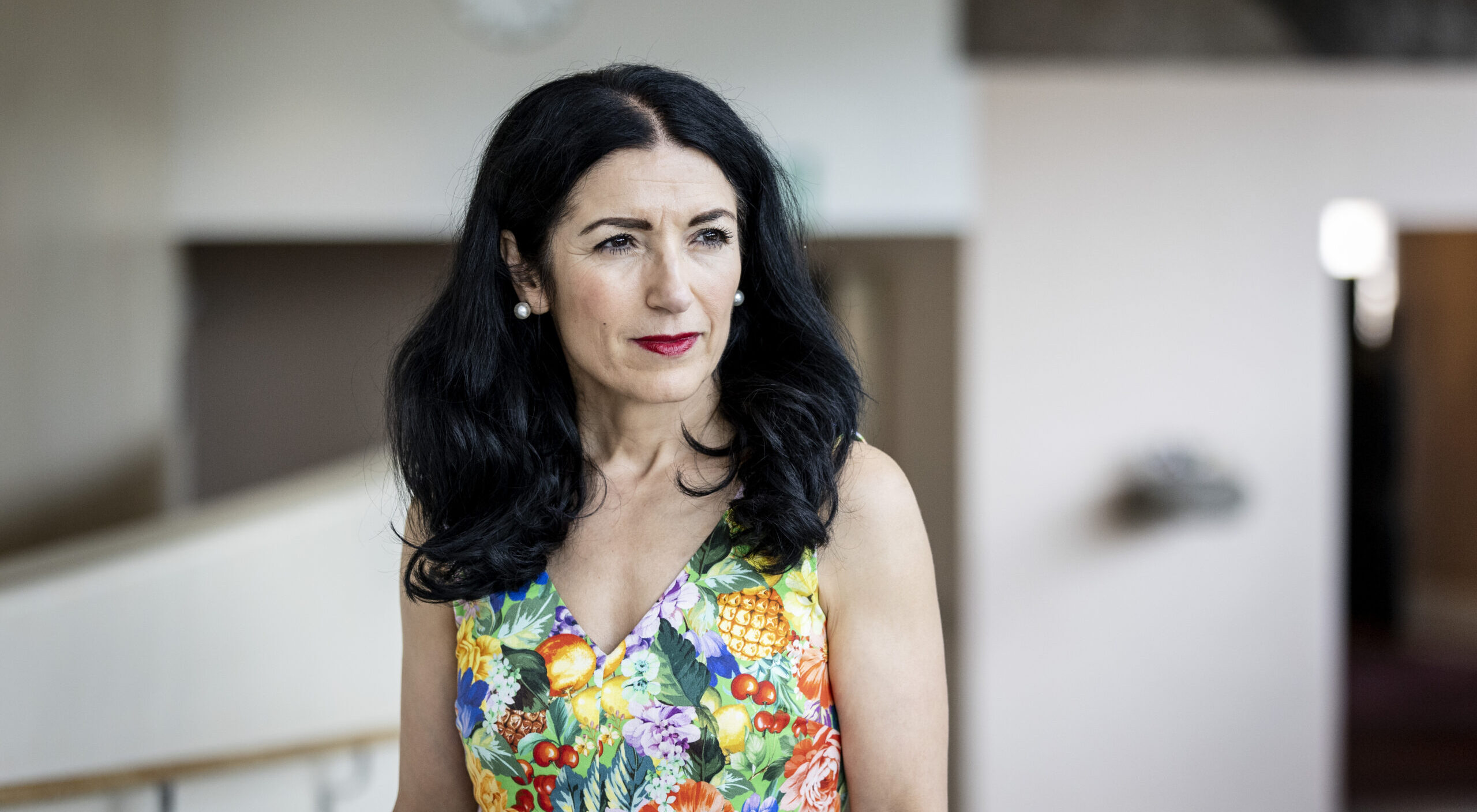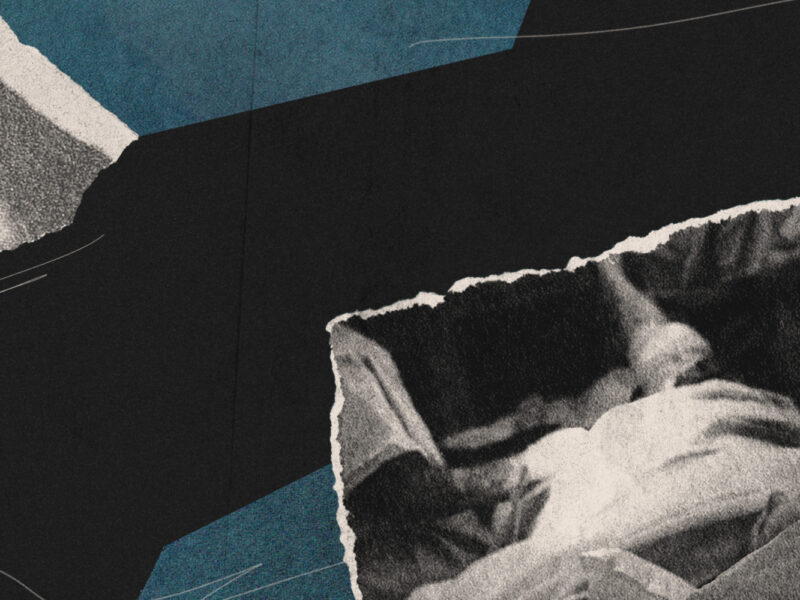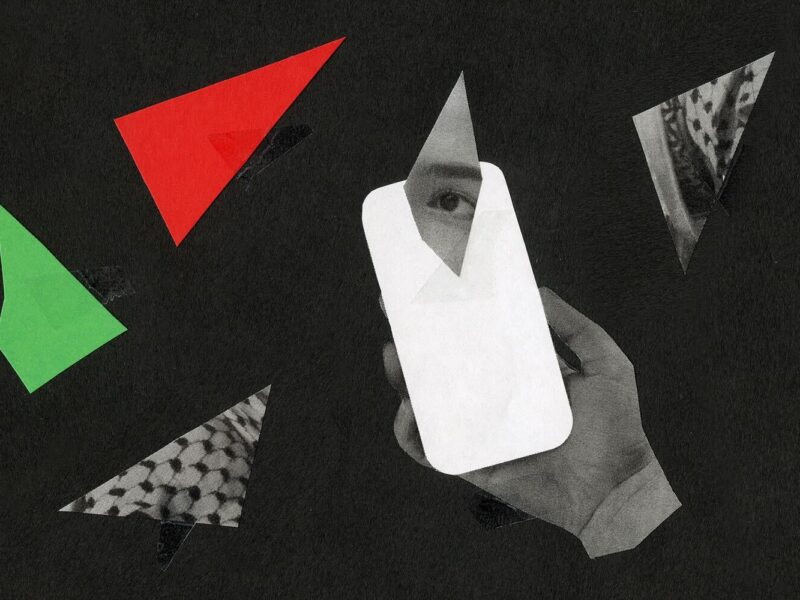Last year, all eyes were on the Kurdish exile turned Swedish MP. Now that she’s left parliament, here’s what she plans to do with the attention.
Amineh Kakabaveh is stumbling over her words as she lists the things representatives of the regime in Iran and their families can still do, despite local authorities’ brutal crackdown on the nationwide protests for democracy that started in September. “They can still put their money in foreign banks, their children can still study abroad, they can still travel,” she says. Sure, she is glad that Iran was thrown out of the UN Committee for Women’s Rights last December. But, Kakabaveh says, it’s far from enough—and it won’t be, as long as they remain a connected member of the international community.
What adds a painful layer to her anger is the fact that she hasn’t seen her own family in Iran in years, and can’t even freely talk on the phone with them out of fear of retaliation by the regime. “Can you imagine I haven’t seen my father for 23 years?,” she says. “My mom told me on the phone she feels for the mothers. That’s all she can say without getting in trouble.”
Kakabaveh, 48, is a Kurdish-Swedish woman who was only 13 years old when she ran away from suppression and threats by Iran’s then still fairly new Islamic regime to join the armed Kurdish opposition group, the Komala Party. After six years in the mountains of Kurdistan in both Iran and Iraq, she crossed the border into Turkey at 19. From there, she was re-settled to Sweden, where she started getting a formal education for the first time in her life. She made it to university, studying both sociology and philosophy, before entering the Swedish parliament for the Green Party at the age of 35.
Through it all, her resistance against the regime has never faded. But while she has always been rather well-known in Sweden for her political work, the outside world only got to know her last year, when she was suddenly in the eye of a geopolitical storm. Sweden had applied for NATO membership to protect itself against Russian threat after the invasion of Ukraine, but met objections from NATO member Turkey, which wouldn’t give permission for Sweden’s acceptance if it kept supporting Kurdish “terrorists.” They even have one in their parliament, Turkey’s president Recep Tayyip Erdoğan fulminated, referring to Kakabaveh.
She had irritated him, to say the least. After years as an MP for the Green Party, she had become an independent MP in 2019, and as such had power to make or break any government plans: Her one vote defined whether it would get a majority or not. She used that power to force the Swedish government to express its support for the Kurds in Syria, who have been building an autonomous region in the country’s northeast since 2012. There have even been pictures of Swedish officials with what Turkey considers “terrorists” as a result of her work, not to mention the Swedish government’s decision to stop selling arms to Turkey because of the country’s invasion into Syria in 2019. (The embargo has since been lifted.) In retaliation, Erdoğan pledged that Sweden would never become a NATO member until it stopped this support.
The power play between states continues. And while the attention has shifted away from Kakabaveh, who is no longer a member of parliament since the elections in September last year, her attention hasn’t shifted away from politics. Today, she travels throughout Europe, speaking in parliaments from Belgium and Spain to Greece and France, drawing attention to the plight of the Iranian people in general, and that of the Kurds specifically.
Kakabaveh grew up in Seqiz, a town in Kurdistan in northwest Iran—the same town Jina Mahsa Amini was from, the girl who was murdered by Iran’s “morality police” for not properly wearing her hijab when she visited the country’s capital city of Tehran last September, sparking protests around the world. Kakabaveh’s family was so poor that having any kind of childhood was impossible for her. In her memoir, “No bigger than a Kalashnikov”: A Peshmerga in Parliament, she shared how she started working at age six to contribute to the family income. She spun wool, she wove and embroidered, and she did seasonal work in fields and orchards, for which she was paid in fruit and beans. Then, on the radio, a very young Kakabaveh heard about the armed communist opposition group, Komala—and decided that one day, she would join. “An uncle of mine had joined them when I was very small,” she says. “I dreamed about that. I knew that Komala had female peshmerga, too,” referring to the Kurdish fighters whose name literally means “those who face death.”
While Kurdish groups initially supported the revolution in 1979, the new government hadn’t lived up to its promises to them: Kurds didn’t get more rights, or even autonomy. A Kurdish uprising was brutally put down. Amineh was 7 years old when it happened. Soon, the regime started targeting her family after several of its members joined the resistance. Repression increased. “In some media I have been described as a child soldier,” Kakabaveh says, “because I joined the peshmerga when I was 13. But that term doesn’t do justice to reality and to our traumas. The regime abused me, they wanted to lock me up and rape me, they tortured and humiliated my father. They suppress Kurdish culture and rob us of our dignity.” Kakabaveh adds that, while formally, members must be 18 to join Komala, she felt the group “tried to create a place that was as safe as possible for their young members.”
Initially, Komala was based inside Iranian borders, but when that became too dangerous, it retreated to Kurdistan in Iraq. The group is still based there. Although the current demonstrations in Iran are not organized by Komala or other Iranian-Kurdish groups, they are still targeted by the mullahs: Since the protests started in September, their camps and villages have been shelled several times, leading to dozens of deaths, including civilians.
Kakabaveh’s life as a 13-year old peshmerga in the mountains of Kurdistan seems to be light years away from her life as an academically educated former MP in Sweden. But she says her experiences as a young girl in Iran and later as a Komala guerrilla fighter define what she fights for now as a politician and activist. “My mother was forced to marry my father, and that was the same for all the girls,” she says. “All Kurds are suppressed by the regime, but women are also suppressed by the patriarchy. Especially when the Swedish minority government needed my support to govern, I have been able to do a lot to put the Kurdish struggle and the women’s resistance on the international agenda.”
She isn’t sad, she says, that she no longer has a place in the country’s most important meeting hall. In her many years of parliamentary work, she built an enormous international network, which she uses now to draw attention to the situation in Iran from across the world.
In direct contact with her family, though, she still must be extremely careful. “I have talked to my mother only twice since the protests started, very shortly via the phone of one of her neighbors,” she says. “That she said that she is sorry for the mothers tells me a lot. The regime takes children away, takes them to prison, rapes them, tortures them, and sentences them to death.”
What angers her is that the international community doesn’t act decisively enough against the regime in Tehran. That is her most important message now: If she could stand up to it at 13, if people everywhere in Iran continue to pour into the streets in protest despite the suppression, the torture, and the death penalty—why aren’t they getting more support? Canada and Australia have issued sanctions, but that’s about it, she says. “Freeze their money, stop giving visas to them and their families, make them pariahs.”
The protests have been going on for almost six months now. Initially, international media reported on them extensively, but that has been fading away. Are the demonstrations fading away, too? “Not at all,” Kakabaveh says in a fierce voice. She mentions Kurdistan as one of the centers of the demonstrations in the northwest, but another region, Baluchistan, in the southeast, too. “Every Friday after prayers thousands of people protest in Zahedan, the biggest city in Baluchistan,” she says. “Also in Kurdistan the protests are ongoing. Kurdistan and Balochistan are the light and the eyes of Iran. But the militarization is intensifying. There are more Pasdaran [Revolutionary Guards] outside schools than students.”
Describing these two communities, the Kurds and the Baluchs, as “the light and the eyes” of Iran explains the depth of the current wave of demonstrations. According to reports by human rights organizations like Amnesty International and Human Rights Watch, it’s the minority groups who suffer the most, and in multiple ways. Both Kurds and Baluchs are not only ethnic minorities, but also predominantly Sunni Muslim, while the regime is Shia. All Iranians suffer under the dictatorship, but communities who don’t fit the default identity of Persian Shia Muslim suffer more. It was not a coincidence that the protests started with the death of a Kurdish girl, whose funeral marked the first big outpouring of grief and anger over the regime’s brutality. That’s why it’s important to name her as Jina Mahsa Amini: Jina is her Kurdish name, which only her family used, because Kurdish names are not officially accepted. It is written on her gravestone.
This dynamic was one of the topics addressed during a recent panel in the Flemish parliament, in which Kakabaveh spoke alongside two other Iranian women in exile. Kakabaveh stressed that ethnic and religious minorities would still be suppressed if the current regime was to be replaced by a secular but still nationalist one. After all, the current regime is not the first to suppress Kurds, a group that resisted the previous regime, as well. “You know, I am 48 years old and in my lifetime I have never seen democracy in Iran,” she said. “So what can we expect? For example, one of the things the women are protesting against, is the forced wearing of the hijab, but do they know the fundamental freedoms underlying this demand? That remains to be seen.”
But in her speech, Kakabaveh drew hope from her past experiences as well. She reflected on her discussions with her male comrades when she was still a peshmerga in the mountains, and how they treated her differently without realizing it. “They accepted women as peshmerga fighters, but their mentality was still male-focused and the leading positions were taken by men,” she said. “I criticized them for it. They said they supported women’s rights but had to learn. And they have learned a lot since.”
Now that what she calls a “revolution” has broken out in Iran, Kakabaveh says she is actually glad that she is no longer an MP. As an activist with a network, with a story to tell and a vision to share, she has all the freedom to travel and speak however she pleases, reaching both loyal and new audiences. In the coming months, she’ll be returning to Greece, as well as France and Germany. And while to the outside world, it may seem as if the protests don’t really have leadership, Kakabaveh believes otherwise. “The people themselves, the women who are fighting for their rights so bravely, are the leaders of this revolution,” she says. She is just hoping to help serve them.



